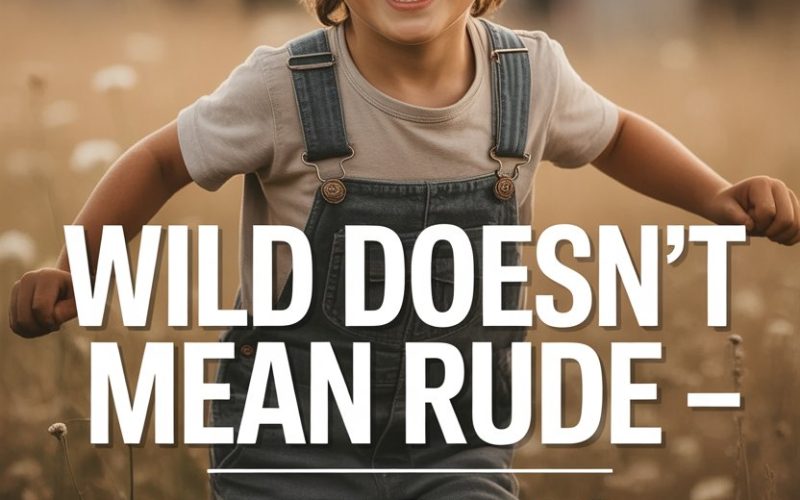Boys, huh? A noise in the next room, muddy footprints on the newly mopped floor, and a running commentary about dinosaurs at dinner.
If you’re raising boys, you probably know the difference between wild and rude—at least, you do on your good days.
But when the energy spikes, tempers flare, and your wild child is swinging from the banister like a caffeinated gibbon, it’s easy to wonder: Am I raising a future gentlemen or the next Lord of the Flies?
Let’s untangle the difference between untamed spirit and poor manners, and see how you can nurture one without inviting the other for a permanent sleepover.
Boys Aren’t Broken — They’re Just Loud
Before anything else, breathe. That boundless energy? It’s not a flaw; it’s biology.
Researchers have found boys’ brains develop a bit differently than girls’, especially in areas related to impulse control and activity levels (Harvard Health).
In other words, your son’s urge to turn the sofa into a trampoline isn’t a sign of faulty wiring.
Still, somewhere between “spirited” and “feral” lies a boy who is both free and kind. The trick is giving permission for the wild, while teaching the basics of respect.
Rudeness Isn’t Inevitable
Many parents worry that if they let boys be wild, good manners will get trampled. Spoiler: having fierce, adventurous boys doesn’t mean surrendering all hope of “please” and “thank you.”
Think of wildness as a strong current—redirect it, rather than damming it up completely.
A child who feels seen and accepted (mud and all) is far more likely to listen when you explain why fart jokes at nanna’s dinner table aren’t on.
Catch Them Being Kind
The phrase “boys will be boys” has earned more than one parental side-eye, and for good reason. Yet boys can be capable of fierce empathy and startling generosity, especially when you point it out when it happens.
Noticing when your son shares with a sibling, comforts a mate, or even helps carry in the groceries sets a clear standard: kindness counts.
Don’t wait for grand gestures. A simple “I saw how you let your sister go first—she looked happy” reinforces the idea that wildness and respect can live under the same roof.
Boundaries Make Room for Freedom
Kids, especially the wiggly ones, need boundaries more than ever. Think of them as the garden fence that lets your boy run wild without ending up in the neighbour’s petunias.
Keep your expectations clear (and repeat them until you’re blue in the face, because repetition is the soundtrack of parenting).
“Inside voices,” “gentle hands,” “no wrestling in the kitchen”—these aren’t just nagging noises. They’re the scaffolding that lets boys have big feelings and even bigger ideas—without losing track of kindness.
And let’s be honest: boundaries work best when they’re consistent. No, it’s not riveting. Yes, it’s exhausting.
But the more predictable you are, the less your child will need to push just to figure out where the edges are.
Let Them Be Physical—Productively
Wild energy doesn’t evaporate just because you asked nicely, and boys, especially, need a safe outlet for moving their bodies.
Physical activity reduces aggressive behaviour and improves self-control (Child Mind Institute), and that applies to every child, not just the ones with a diagnosis.
Set aside time for rough-and-tumble play, outside time, and even indoor wrestling (on a soft surface, in a room with no breakables—your grandmother’s vase thanks you).
You’ll find your boy is more able to sit for tea with Great Aunt Agatha if he’s had 20 minutes of racing the dog around the yard.
And if you’ve ever tried to stifle a boy’s urge to leap, climb, and spin, you know it’s a losing battle.
Far better to channel that energy than to bottle it up—because nothing says “I’m about to explode” like a six-year-old forced to “just sit quietly” for too long.
Rudeness Is a Skill Issue, Not a Character Flaw
Every child, wild or mild, will blurt out something mortifying at some point. Rudeness often comes down to not knowing what to do or say, rather than a deep-seated character defect.
Role-play common situations: “What do you say when someone gives you a present?” “How do you tell a friend you need space without shouting?”
Keep it light and silly—you’ll get more engagement if you make it a game than if you deliver a PowerPoint on Table Manners 101.
Sometimes, you’ll need to model apologising yourself. Spilled the milk while fussing at your son for not sitting still? “Oops, I made a mess—sorry about that!”
There’s nothing more powerful than seeing the grown-ups admit mistakes, too.
Respect Looks Different in Different Boys
Not every boy will say “please” in a way that sounds like a Nancy Mitford hero. Some boys are shy and mumbly; others are cheeky as a box of monkeys.
Manners aren’t one-size-fits-all.
Allow your son to develop his own style of respect. Maybe he holds the door awkwardly, or hands you the remote just because he knows you fancy the telly.
The heart of manners is respect—not performance. The more you focus on intent over form, the more natural kindness feels.
The Wild Has Wisdom
Don’t rush to tame every noisy urge. Wildness is how boys discover the world and themselves.
The same curiosity that leads to muddy knees and windowsill caterpillar farms also fuels creativity, courage, and problem-solving skills (Stanford research).
Your wild boy might be the one who asks why the sky is blue, or who invents a new game every other afternoon. Celebrate that spark, even as you gently teach when it’s time to dial it down.
You’re Not Alone—And Neither Are They
Every parent has had the moment in the supermarket when their son is doing laps around the trolley, singing about poo. Don’t mistake embarrassment for evidence you’re failing.
Connect with other parents—sometimes a sympathetic nod from another mum or dad is worth its weight in coffee. Share the stories, swap tips, and keep a sense of humour about the wildness.
Community makes it easier to see the difference between normal spiritedness and something that needs a little tweaking.
And every boy, wild or not, needs to know he’s accepted—loud bits, muddy bits, awkward bits and all.
When Wild Crosses the Line
There’s a difference between energetic fun and behaviour that hurts others.
If your son is consistently disrespectful, aggressive, or seems unable to calm himself even with support, it might be time to check in with your child’s doctor or a child psychologist (Australian Parenting Website).
Sometimes, wildness is a sign they need more help—never a reason for shame.
Most of the time, though, it’s just that your boy is being, well, a boy. And that’s good news.
Let Them See Good Men in Action
Role models matter—more than a thousand lectures on “how to be polite.”
Boys who see men treating others with respect, handling big emotions with honesty, and owning up to mistakes are more likely to follow suit (Greater Good Science Center).
Seek out opportunities for your son to spend time with men who embody the blend of wildness and kindness: family, teachers, coaches, community volunteers.
And if you’re worried that your home is filled with nothing but chaos and mismatched socks, take heart. Your everyday acts of kindness are teaching more than you think.
Wild One, Welcome
Raising good boys isn’t about taming them into little gentlemen who never drop a crumb or shout in excitement. It’s about giving them room to be their wild, wonderful selves—while offering the steady hand of guidance.
Every muddy footprint is a memory-in-the-making, every shouting match a chance to practice patience.
With a balance of boundaries, role-modelling, and the occasional deep breath, you’ll raise boys who are not just wild, but good—and isn’t that the best kind of boy to have around?





